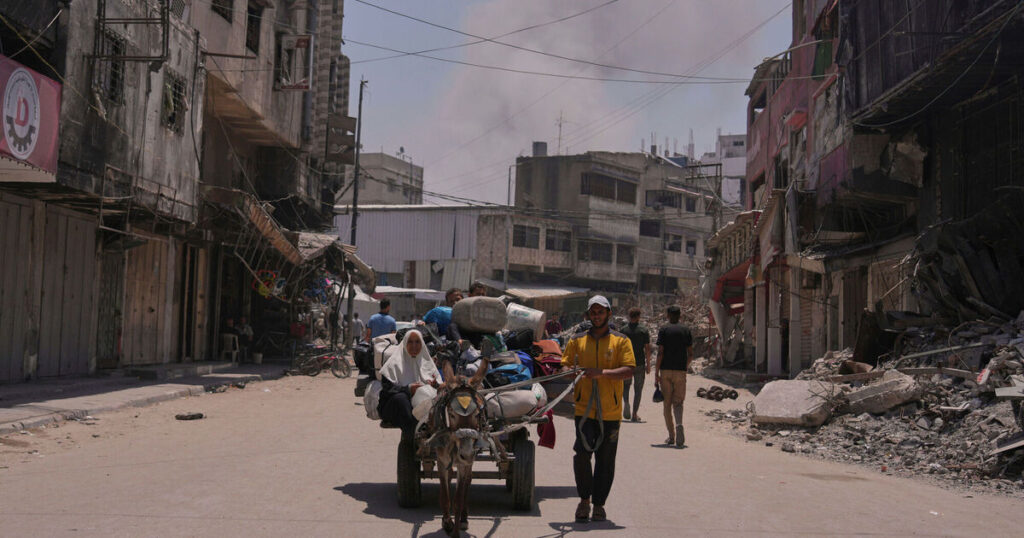Hamas said on Saturday that it had submitted its response to a proposal presented by Donald Trump’s Middle East envoy, Steve Witkoff, to mediators, the most concrete sign of progress towards a ceasefire since March.
The Palestinian group said in a statement that under the deal, it would release 10 living hostages and 18 bodies in return for Israel’s release of Palestinian prisoners. The response included a demand for an end to the war, which had previously been a red line for Israel.
The Hamas response appears close to a previously reported version of the deal, which specified that the group would release 10 hostages, as well as a number of hostages’ remains during the ceasefire in exchange for 1,100 Palestinian prisoners.
The Hamas statement said: “This proposal aims to achieve a permanent ceasefire, a comprehensive withdrawal from the Gaza Strip, and ensure the flow of aid to our people and our families in the Gaza Strip.”
It said its response came “after conducting a round of national consultations”.
The US ceasefire proposal reportedly involves a 60-day pause in fighting and a redoubling of efforts towards long-term peace, as well as guarantees from Israel that it will not resume its offensive after Hamas releases hostages, which the country did in March.
A leading Hamas official Basem Naim said on Thursday that the US proposal “does not respond to any of our people’s demands,” including lifting the humanitarian blockade on the Gaza Strip that has led to famine-like conditions among the population of two million.
The group’s reaction provoked the ire of their Israeli counterparts. Israel’s defence minister, Israel Katz, threatened the group on Friday with “annihilation” if it did not accept. “The Hamas murderers will now be forced to choose: accept the terms of the ‘Witkoff deal’ for the release of the hostages – or be annihilated,” said Katz.
A previous ceasefire collapsed in mid-March after Israel refused to move to a planned second phase that could have led to a permanent end to the war, and instead restarted its offensive in the Gaza Strip. Negotiators have met in the months since in an attempt to reach a ceasefire, with little progress to show for it.
More than 54,000 people have been killed in Gaza since Israel launched its war on the besieged Palestinian terrority on October 7 2023. The Israeli offensive was in retaliation for a Hamas attack on the same day, which saw the group kill about 1,200 people and take 250 hostages. Fifty-eight hostages are believed to still be alive and their return is a key demand of ceasefire negotiations.
As negotiations over ceasefire continued, Israel’s offensive in Gaza has ramped up. At least 60 people have been killed by Israeli strikes in Gaza over the last 24 hours, health officials said, while 72 people were killed on Thursday.
Israel stopped allowing virtually all humanitarian aid into Gaza when it resumed hostilities in the Palestinian territory. The nearly three-month Israeli blockade on Gaza has pushed the population of more than 2 million to the brink of famine. While pressure has slightly eased in recent days as Israel allowed some aid to enter, aid organisations say far from enough food is getting in.
“After nearly 80 days of a total blockade, communities are starving – and they are no longer willing to watch food pass them by,” the World Food Programme said on Saturday. The UN aid agency had been allowed to bring 77 trucks loaded with flour into Gaza overnight, but the trucks were stopped en route by crowds of hungry people.
Israel’s acceptance of the US proposal is the most serious step to achieving a ceasefire since March. The UN and regional powers have urged both Hamas and Israel to agree to a deal to put an end to fighting in Gaza and its humanitarian consequences.
“Negotiations are ongoing on the current proposal,” Qatar’s ambassador to the United Nations, Ayla Ahmed Saif al-Thani said on Friday, adding that Qatar was “very determined to find an ending to the horrific situation in Gaza”.
Israel prevented a delegation made up of foreign ministers from five Arab countries from visiting the occupied West Bank on Saturday as planned, where they had planned to meet President of the Palestinian State, Mahmoud Abbas, to discuss the establishment of a Palestinian state.
41641075[#embed6]


